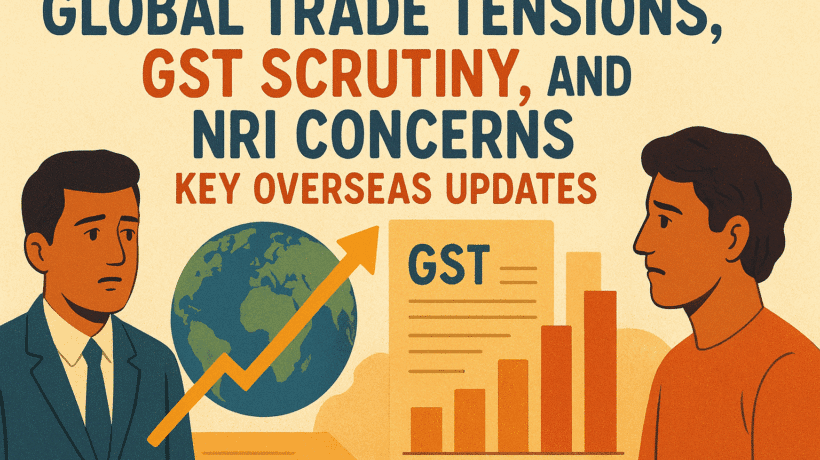Global Trade Tensions, GST Scrutiny, and NRI Concerns: Key Overseas Updates
Introduction
Fresh global trade tensions are resurfacing as the US signals new tariff threats and the G7 summit sparks debates on international trade policies. These developments are set to impact Indian exports, IT services, and compliance obligations for overseas businesses. At the same time, the NRI community continues to monitor global interest rate movements that influence remittances, deposits, and market participation.
Global Trade Pressures
The renewed trade threats from the US are raising concerns for Indian IT and export sectors. Outsourcing strategies may undergo reassessment, as overseas clients weigh the risks of higher tariffs and policy shifts. Exporters are expected to focus on cost control and compliance efficiency to stay competitive in volatile global markets.
GST Compliance for Overseas Businesses
Increased scrutiny is being placed on foreign investments and businesses engaging with India under the revised GST framework. With import and export tax rates evolving, overseas companies must adapt their invoicing, payment, and compliance processes to avoid penalties. Proactive compliance is becoming a critical necessity for smooth trade operations.
NRI Concerns on Global Rates
For NRIs and the wider overseas Indian community, global interest rate decisions remain a key factor. Rising or fluctuating rates directly affect remittances, deposit yields, and equity participation in Indian markets. These movements continue to shape financial planning strategies among NRIs worldwide.
Conclusion
As trade tensions escalate and compliance requirements tighten, exporters, NRIs, and overseas businesses must stay vigilant. Understanding the dual impact of global economic shifts and India’s regulatory changes is essential to navigating risks and unlocking opportunities.
FAQ'S
Q1. What immediate risk do renewed US tariff threats pose to Indian exporters and IT?
Higher tariffs can raise client costs, prompt reshoring or nearshoring, reduce contract volumes, and compress margins — especially for IT and export-oriented firms dependent on US clients.
Q2. How should exporters prepare for rising trade tensions?
Diversify client geographies, review & renegotiate contracts, strengthen value-added services, tighten cost controls, and use trade/legal advisors to assess contractual exposure.
Q3. What GST compliance issues should overseas businesses and NRIs watch?
Update invoicing/billing systems for revised GST rules, confirm correct tax treatment on imports/exports, split advances by payment date, and ensure timely registration where required to avoid penalties.
Q4. How do global interest-rate moves affect NRIs?
Rate changes influence remittance value, deposit yields (home vs abroad), borrowing costs, and equity flows — altering returns on NRI savings and investment allocations.
Q5. Will G7 debates or statements immediately change trade policy?
Not immediately — G7 shapes global dialogue, but concrete policy changes require national legislation or executive action; businesses should monitor both international signals and domestic rule-making.
Q6. What short-term actions can NRIs and overseas firms take right now?
Monitor policy updates, consult tax/compliance advisors, update accounting/invoicing systems, consider currency hedges, and model pricing scenarios under possible tariff/ GST changes.
Q7. Where should readers look for authoritative updates?
Official sources: CBIC/GST Council notifications, Ministry of Commerce, RBI releases, finance ministry announcements, and reputable business/financial news outlets.





